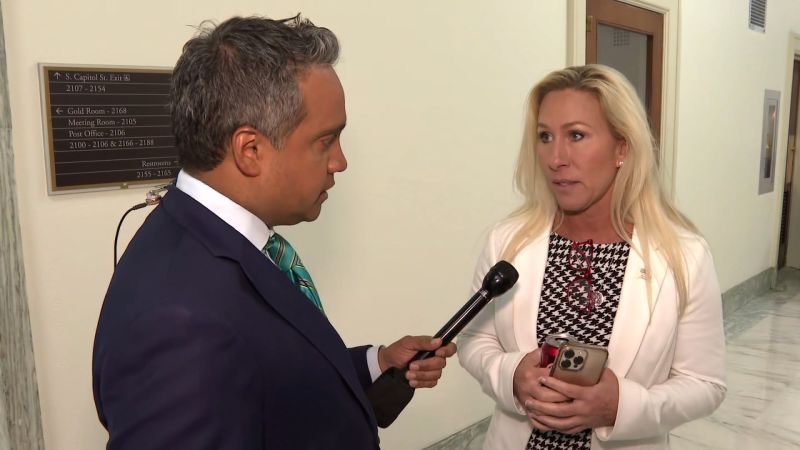House Speaker Mike Johnson made the decision to move forward with a series of foreign aid bills, including funding for Ukraine, despite facing pressure from hardliners within the Republican Party. This decision comes after Johnson had initially considered blocking the bills due to concerns about government spending. However, he ultimately chose to push ahead with the legislation, which includes financial assistance for Ukraine amidst ongoing tensions with Russia.
In response to Johnson’s decision, Rep. Marjorie Taylor Greene, a vocal member of the Republican Party from Georgia, pushed for a motion to oust Johnson as speaker. In an interview with CNN’s Manu Raju, Greene expressed her dissatisfaction with Johnson’s leadership and called for a change in leadership within the party. Greene’s motion reflects growing divisions within the GOP, with some members advocating for a more aggressive stance on issues such as foreign aid and government spending.
Johnson’s decision to proceed with the foreign aid bills signals a willingness on his part to prioritize global issues such as supporting Ukraine in its conflict with Russia. This move may also be seen as an attempt to maintain unity within the Republican Party and avoid further divisions over foreign policy and spending priorities. By choosing to move forward with the legislation, Johnson is setting a course for the party’s stance on international affairs, despite facing criticism from some members on the right.
The tension within the Republican Party over foreign aid and government spending reflects broader disagreements within the party over key policy issues. While some members, like Greene, advocate for a more conservative approach that focuses on cutting government spending and limiting aid to foreign countries, others, including Johnson, prioritize maintaining relationships with allies and supporting global initiatives. These differences in opinion highlight the challenges facing the GOP as it seeks to define its stance on foreign policy and fiscal responsibility.
Greene’s motion to oust Johnson as speaker is a clear sign of the ongoing power struggles within the Republican Party, as different factions vie for control and influence over the party’s direction. Johnson’s decision to proceed with the foreign aid bills in the face of pressure from hardliners suggests a willingness to assert his leadership and make decisions that align with his priorities and values. As the party continues to grapple with internal divisions, the outcome of these conflicts will likely shape the GOP’s platform and approach to key policy issues in the coming years.
Overall, the tensions within the GOP over foreign aid and government spending underscore the broader challenges facing the party as it seeks to navigate complex policy issues and maintain unity among its members. Johnson’s decision to move forward with the foreign aid bills, despite facing pushback from within his own party, highlights the delicate balancing act required to lead a diverse group of lawmakers with varying priorities and perspectives. As the GOP grapples with these internal conflicts, the outcome of these debates will shape the party’s position on key policy issues and influence its effectiveness in governing and advocating for its constituents.













